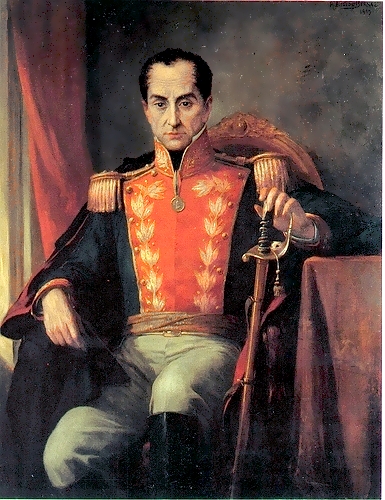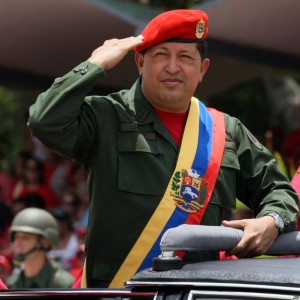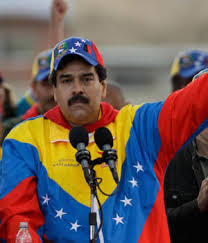
On September 7th 1821, General Simon Bolivar stood astride a liberated land colossus of current day Venezuela, Columbia, Bolivia, Peru, Panama and northwest Brazil as President of the republic of Gran Columbia. Born of the age of Enlightenment, and intensely shaped by the American and French Revolutions, Bolivar envisioned the possibilities of his own native Latin America and with brilliant strategy helped by 1825 to eject the Spanish overlords from nearly half the Latin American continent. A fervent admirer of the American experiment and philosophy of Jefferson he none the less differed from the American founders in two significant ways. He was virulently against slavery, and he felt the 400 year Spanish rule of the region had corrupted the capacity for unfettered democracy. He described the Spaniards as having dominated through unholy triad of “ignorance, tyranny and vice”, and that it would take a firm leader to shepherd the people to a point where their own aspirations could be fairly realized.
Simon Bolivar, a son of Venezuela born in Caracas, but father to the hopes and dreams of an entire continent, could not know that his efforts to mold the concepts of the American dream to a Latin American version of paternal guidance, would lead to two hundred years of pretenders, who would corrupt Bolivar’s vision and retrench the concept of master rule.
The nineteenth century of nationalist dictatorships gave way to a twentieth century of military dictatorships, with patchy occasional experiments with democratic process. The new century has found an even more disturbing model in Bolivar’s home, Venezuela. A military coup leader, Hugo Chavez, who in the fine tradition of South American militaries unsuccessfully attempted in 1992 to overthrow the democratically elected government of Venezuela, was elected in 1998 to the presidency of Venezuela, on a

platform of providing the poor with their fair portion of the bounties of the state. After his failed coup in 1992 and brief imprisonment, Chavez was released from prison, and determined to learn from the coup master Fidel Castro as to how to attain ultimate rule. Castro’s unique combination of fascist and socialist tenets, creating one man permanent rule and a progressive destruction through socialism of a nation’s economic fabric, had succeeded in holding Cuba for the Castro family for fifty years. Chavez saw Venezuela as prime for a similar future, with one spectacular advantage Castro could only dream of, Venezuela’s huge oil reserves available to fund the vision. Chavez had learned well from Castro, and declared upon winning the Presidency, “the resurrection of Venezuela has begun, and nothing and no one can stop it.”
Nationalizing the oil wealth and reorienting media and government to fit his vision, Chavez ruled for 14 years, progressively organizing the socialist state to permanence, and was stopped only by cancer leading to his death in 2013. Using the Castro concept of “permanent revolution”, he was able to suppress rising discontent from the Venezuelan middle class that had progressively to pay for the brunt of his anti market strategies. Learning from Castro the necessity of fascistic imagery, Chavez put for his charismatic personality in similar form, wearing the uniform of the revolutionary, promoting the concept of an “indispensable” leader, railing against anyone who saw through his cartoon image.
The plan broke down with Chavez’s cancer, and he was forced to find a substitute who would continue the process of centrally dominating the Venezuelan society. His clone was to be Nicolas Maduro, a union leader of bus drivers, who had worked his way up Chavez’s inner group, and had the willingness to maintain the grip on power that would be necessary when the charismatic Chavez was no longer on the stage.

Maduro has positioned himself to be the natural successor to Chavez’s one man rule, creating laws for the purpose of centralizing military and police power, declaring”economic war”, and requesting emergency dictatorial powers. The typical effect of socialistic management and fascistic cult worship is leading to a historical collapse of Venezuela’s economy, and the people are getting tired of the pretender to the cult. Maduro is no Castro, no Chavez, and definitely no Bolivar when it comes to charisma and is responding to progressive societal unrest with all the subtle reflexes of a union thug. Average Venezuelans have seen the oil wealth squandered to create a price control economy now with an inflation rate of 56%, among the highest on earth, with massive shortages of daily necessities, such as medicine, food, and even toiletries. Maduro has responded to the unrest in the nature of a strongman, using force to suppress protest, resulting in injuries and death, and increased suppression. Like Ukraine earlier this year, Venezuela is heading for a showdown and the cap on significant violence may be uncapped in a horrific way.
Simon Bolivar hoped that eventually the yoke of Spanish intimidation, once lifted, would allow the flourishing of a better life for Latin Americans in a land of immense resources. His problem was that he presumed that the men who would follow Bolivar would be upholders of the Rights of Man, not pretenders to the goals of his revolution. The false promise of the twin deceivers of socialism and fascism is that they exist for the benefit of the people. As the current Pretendiente Maduro in Venezuela, like all before him, has proven, the only ones who will ever see a better life in the socialist reality are the elite, and the rest of us are left to accept their good graces if they so desire.
As for the violent suppression of a people, Washington DC is likely once again to stand silently by. After all, we have our own Pretendiente to consider.